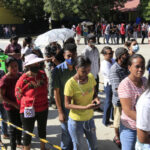
Vice President Kamala Harris on Monday pledged that the United States would not conduct destructive anti-satellite tests and called on other nations to follow suit, in her first major policy announcement since taking the reins of the National Space Council last year.
The commitment, during a visit to Vandenberg Space Force Base in California, comes as the Biden administration seeks to build new momentum for international norms to ensure that the space race can be sustained and to reduce the chances of conflict in orbit.
“As of today the United States commits not to conduct destructive, direct-ascent, anti-satellite missile testing,” Harris said. “Simply put, these tests are dangerous and we will not conduct them. We are the first nation to make such a commitment. I call on all nations to join us.”
The pledge covers ASAT tests in which a missile is launched from Earth or an aircraft at high altitude to blow up a satellite.
Such tests, which have been conducted by the United States, Russia, China and India, dating back to the Cold War can create thousands of pieces of debris that pose a hazard to spacecraft for decades.
The announcement does not include other less destructive ASAT weapons, such as “co-orbital” — which use another spacecraft to interfere with a satellite in orbit — or electronic jamming and computer hacks.
The pronouncement comes after Russia fired a missile at one of its own satellites in November, creating thousands of pieces of space junk and sparking an international outcry and new calls for a ban on such tests.
Harris also cited a 2007 test conducted by China in 2008 that created 2,800 pieces of debris still orbiting the Earth.
“These tests, to be sure, are reckless, as they are irresponsible. These tests could also endanger so much of what we do in space,” she added, citing the risk to both satellites and astronauts.
“The direct-ascent ASAT tests have been the biggest single event generator of debris we have seen,” said Marlon Sorge, a principal engineer for the Space Innovation Directorate at the Aerospace Corporation, a government think tank. “A typical one of these events will make hundreds of thousands of pieces of debris that are lethal if they hit a satellite, and the vast majority we can’t track. So you can’t avoid them, which makes them a particular problem for making it safe to operate in space.”
The commitment by Harris, who oversees space policy as head of the Cabinet-level space council, goes further than the “tenets of responsible behavior in space” issued last year by Defense Secretary Lloyd Austin, which included a call to “limit the generation of long-lived debris.”
“It also matters because it demonstrates the U.S. is serious” about Austin’s tenets, said Michael Gleason, senior project engineer in Aerospace’s Center for Space Policy and Strategy.
The pledge also comes as a United Nations Open-Ended Working Group is set to hold its first talks on “reducing space threats” in Geneva beginning the week of May 9.
“This could shape the conversation and give it some structure,” said Victoria Samson, Washington director for the nonprofit Secure World Foundation, which is dedicated to the peaceful uses of outer space.
She called it “a first step in getting the international community on the same page regarding what is considered responsible behavior in space and, perhaps even more importantly, irresponsible behavior.”
“I hope that this commitment is picked up and run with there by other countries,” she added.
“If enough countries also make this commitment, eventually this could become a nonbinding resolution or a binding treaty. But that’s way down the line.”
It is unclear how China or Russia will respond. They have been calling for years for an international treaty banning the placement of weapons in space, but successive U.S. administrations have called the proposals unverifiable.
“Now the U.S. ideally will have something where they can say, ‘Well, look at this, we would like you to also commit to not doing direct-ascent kinetic ASAT tests anymore,’” Gleason said. “If they decline, then the U.S. has put the onus on them.”
The United States, Russia, China and India have conducted destructive ASAT tests by firing missiles into space from Earth or from an aircraft at high altitude.
The most recent was Russia’s November 2021 missile attack on an old satellite that created thousands of pieces of debris.
The United States last conducted one in 2008 under Operation Burnt Frost, in which a missile fired from an Aegis guided missile cruiser destroyed an ailing U.S. reconnaissance satellite at an altitude of 240 kilometers, or 150 miles, according to a recent assessment by the Secure World Foundation.
China, which has also conducted many such tests, last hit a satellite from Earth in 2008, also creating thousands of pieces of debris. And in April last year, the director of national intelligence reported that China had “fielded ground-based ASAT missiles intended to destroy satellites” in low-earth orbit.
India, meanwhile, held a “kinetic” ASAT test in 2019. “While India continues to insist that it is against the weaponization of space, the country may be moving toward an offensive counterspace posture,” the Secure World Foundation assessment concluded.
Harris called on “all nations to join us, whether a nation is space-faring or not. We believe this will benefit everyone, just as space benefits everyone.”
She added that “in the days an months ahead, we will work with other nations to establish this as a new international norm for responsible behavior in space.”
Harris has made pursuing a set of space norms for the space council during its first public meeting in December.
“I believe without clear norms we face unnecessary risks in space,” Harris said on Monday. “We must write the new rules of the road.




